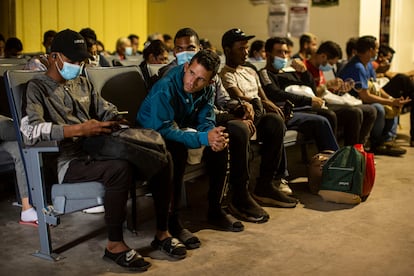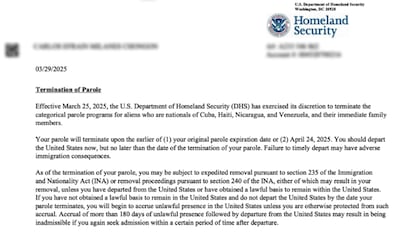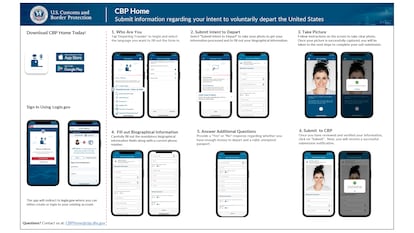Thousands of parole beneficiaries receive a government email: ‘You should depart the United States now’
The 532,000 migrants who entered the country under the protection program that President Trump has repealed have one month to return or may face ‘adverse consequences’


The email he never wanted to receive arrived in his inbox just after noon on Saturday, March 29. “We have taken action on your case and it needs your attention.” It was the first thing he read in the subject line of the message sent by the United States Department of Homeland Security (DHS), the same one that other Cubans like him— he prefers not to reveal his identity — also received, along with thousands of Venezuelans, Nicaraguans, and Haitians.
In total, 532,000 citizens of these four countries were granted legal immigration status by the Joe Biden administration, but have become overnight the newest illegal immigrants of the Donald Trump administration. “You should depart the United States now, earlier, but no later than the date of the termination of your parole,” the message reads.

The letter, to which EL PAÍS has had access, states that the protection granted to nationals of Cuba, Haiti, Nicaragua, and Venezuela, and their families, will expire on April 24. It is the ultimatum issued by the Republican administration for them to return to their respective countries. “We are all afraid. Imagine if you get a letter saying you have to go back to Cuba,” says the young Cuban, who, like most people, is unsure of what to do.
The authorities’ message warns that “failure to timely depart may have adverse immigration consequences.”
The DHS indicates that those who decide to leave the country by land must report their departure through the CBP Home mobile app, the replacement for CBP One and an initiative launched by the Trump administration to allow illegal immigrants to self-deport. Conversely, if the person “does not depart the United States before their parole end date, they will begin to accrue unlawful presence in the United States unless otherwise protected from such accrual.” Accumulating more than 180 days of unlawful presence, they warn, may result in the person being inadmissible if they reapply to the country in the future within a certain period of time.
The Trump administration has never concealed its intentions to end the humanitarian parole created by the previous administration and has scrapped everything to do with a program that allowed up to 30,000 foreigners to enter the country legally each month, under the umbrella of an economic sponsor, and with benefits such as a work permit and legal residence for two years.
The first step was to announce the end of parole the same day that Trump returned to the White House. Then, it was announced that the beneficiaries’ immigration processes would be suspended. Later, it was announced that their legal status would be revoked. And now, a date has been set for them to permanently leave the country, despite the fact that many have started families, acquired property and paid taxes during this time.

In the email, the authorities also mention the revocation of the right to employment that their status had previously granted them. “DHS intends to revoke your employment authorization because the condition under which you were granted employment authorization based on parole [...] no longer exists,” it states.
Immigration attorney Willy Allen, who insists that “the hope of the United States government is that people will leave on their own,” believes that thousands of them will not: “How many people are going to fly alone to their countries?” Therefore, he finds it worrying that many of them will remain for some time without work permits and, therefore, in a legal and economic limbo.
He is particularly concerned about Venezuelan, Nicaraguan, and Haitian migrants who have not yet filed asylum applications. Some Cubans, however, may be safe. “Cubans can legalize their status under the Adjustment Act, which requires an inspection, admission, or parole. It doesn’t require you to be legally present in the country all the time, but only part of the time,” he says. For other nationalities, the lawyer advises applying for political asylum as soon as possible: “They should have already filed their cases; if not, they have this week to do so.”
Sign up for our weekly newsletter to get more English-language news coverage from EL PAÍS USA Edition
Tu suscripción se está usando en otro dispositivo
¿Quieres añadir otro usuario a tu suscripción?
Si continúas leyendo en este dispositivo, no se podrá leer en el otro.
FlechaTu suscripción se está usando en otro dispositivo y solo puedes acceder a EL PAÍS desde un dispositivo a la vez.
Si quieres compartir tu cuenta, cambia tu suscripción a la modalidad Premium, así podrás añadir otro usuario. Cada uno accederá con su propia cuenta de email, lo que os permitirá personalizar vuestra experiencia en EL PAÍS.
¿Tienes una suscripción de empresa? Accede aquí para contratar más cuentas.
En el caso de no saber quién está usando tu cuenta, te recomendamos cambiar tu contraseña aquí.
Si decides continuar compartiendo tu cuenta, este mensaje se mostrará en tu dispositivo y en el de la otra persona que está usando tu cuenta de forma indefinida, afectando a tu experiencia de lectura. Puedes consultar aquí los términos y condiciones de la suscripción digital.








































